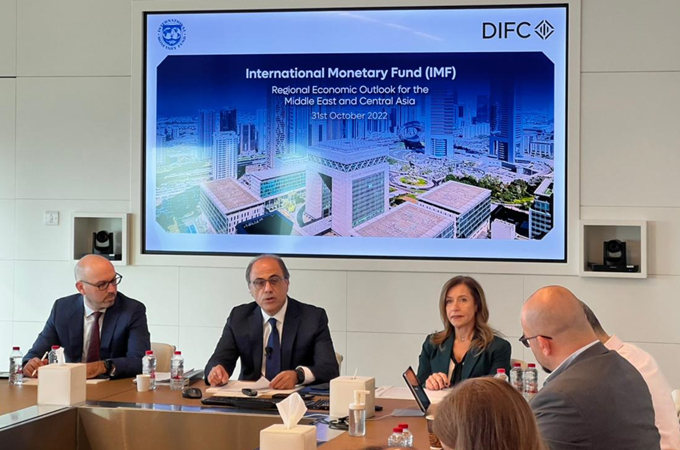
IMF forecasts 5% real growth in region this year
DUBAI, October 31, 2022
The International Monetary Fund (IMF) has forecast a real GDP growth of 5 per cent this year across the region, increasing from 4.1 per cent in 2021, as a multispeed recovery continued in the first half of the year.
The 2023 growth is currently forecast at 3.6 per cent, it was revealed at the launch of the IMF report on the region.
Dubai International Financial Centre (DIFC), a leading global financial centre, and the IMF today co-hosted the first in-person event in three years to launch the October 2022 Regional Economic Outlook (REO) for the Middle East and Central Asia (ME&CA) region.
Crude producers, in particular, are projected to accrue a cumulative oil windfall of about $1 trillion over 2022−26, which oil-exporting countries like the UAE could use to continue to invest in projects that support future economic growth.
Oil exporters’ external accounts, including the UAE, are expected to further improve in 2022−23 as energy prices remain considerably higher than their 2020−21 levels.
Primary non-oil fiscal balances are also slated to improve with most Gulf Cooperative Council (GCC) nations expected to continue to save a substantial share of their oil revenues.
In contrast, oil-importing countries face a deep terms-of-trade shock, higher sovereign spreads, and eroded market access. Nonetheless, robust remittance flows and resurging tourism receipts are helping offset potential headwinds in some countries, the report said.
Uncertainties and downside risks include the possibility that commodity prices remain elevated and result in increased food insecurity and fiscal pressures, inflation proves to be broader and more costly to reduce than expected, and tighter financial conditions push up on government debt service costs and worsen debt dynamics.
The IMF recommends countries to mitigate the cost-of-living crisis, strengthen resilience and growth prospects, and press ahead with a variety of structural reforms. This includes completing energy subsidy reforms in conjunction with enhancing social safety nets that will be key to building resilience to future shocks. Accelerating structural reforms, such as removing barriers to private firms, enacting reforms that reduce informality and improve tax equity, and investing in climate-resilient technology and infrastructure, has become even more urgent, it said.
This will help to mitigate any potential adverse effects on growth and boost productivity. Bolstering medium-term fiscal frameworks will also be critical to anchor confidence in fiscal sustainability, the report said.
Alya Al Zarouni, Executive Vice President at DIFC Authority, said: “DIFC’s long-standing partnership with the IMF on the Regional Economic Outlook report provides us thought-provoking prompts to evaluate and validate our strengths to collectively shape the way forward for the industry and the economy. Economic diversification and a future-focused approach have helped make Dubai and the UAE a role model for resilience in the region. As the UAE continues to invest in projects that support economic growth, there is significant work on the horizon for our financial sector.”
Jihad Azour, Director of the IMF’s Middle East and Central Asia Department, said: “In the near-term, the priorities for all countries are to maintain or restore price stability while protecting the vulnerable, respond to tightening global financial conditions while ensuring fiscal and financial stability, and ensure food and energy security. The worsening global environment, tightening macroeconomic policies, and the limited policy space in several countries raise the urgency of pressing ahead with structural reforms to bolster economic growth while transforming economies to become more resilient, sustainable, diversified and inclusive.”
The IMF’s support remains steadfast in the region. It has supported the MENA region with $16.7 billion in financing since 2020 and allocated $42 billion special drawing rights to boost the region’s reserve assets.
The IMF has adapted its toolkit to address members’ emerging needs by establishing the Resilience and Sustainability Trust, which will support low-income and vulnerable middle-income countries build resilience to external shocks and address longer-term challenges, including climate change. To help address the food crisis facing most vulnerable members, the IMF has also enhanced its emergency financing facilities by establishing a new 'food shock window', said a statement. -TradeArabia News Service








